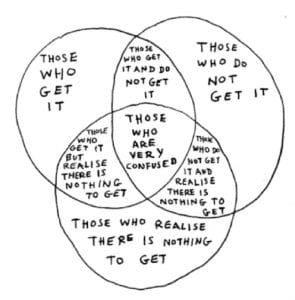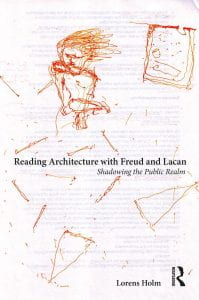
iPSA, the “institute for psychoanalytic studies in architecture,” devotes itself to “the Freudian–Lacanian field.” Jacques Lacan and Sigmund Freud developed ideas that have survived to constitute a stark contrast with the mainstream disciplines of psychology and psychiatry. Lacan realized the value of Freud’s key achievements: the unconscious, the concept of the Other, the drives, and (especially) the controversial death drive. Lacan’s annual seminars, essays, conference lectures and public appearances contributed to his reputation as opaque and unreadable. But, thanks to new translations and the work of groups such as Écrits, LACK, the LacanSalon, Lacan Toronto, the Affiliated Psychoanalytic Workgroups, FLi (Freud/Lacan Institute), Das Unbehagen, and others, dynamic new scholarship is coming into view, with a invigorating exchanges between theory and practice.
Architecture’s interest in psychoanalysis has been sporadic and uneven. Addiction to cognitive psychology and phenomenology has contaminated representations of the unconscious and cemented opposition to concepts such as the death drive. iPSA aims to change these conditions through specific collaborative projects: (1) zoom seminars that reverse the accepted practice of presentations first, discussion (if any) second to start off with informal discussions with diverse voices; (2) “shadow” discussions of upcoming or past conferences, to restore conviviality and debate; and (3) development of reverse-zoom discussions into special-topics issues of Psyche Extended, iPSA’s on-line journal.
Anyone with an interest to join or a proposal for collaboration should contact any member or send a note of inquiry to architecture.lacan.ipsa@gmail.com. Don Kunze is the Recording Secretary of iPSA and designer/manager of the website.
FREUD MUSEUM CFP
The Freud Museum London announces a second cycle of the Freudian Research Seminar Series (FRSS) commencing this autumn 2025. The FRSS convenes virtually once every month and seeks to establish a forum which both cultivates and circulates new psychoanalytically informed research. They welcome both PhD students and Researchers across disciplines to participate and form a community in which new ideas can be openly discussed and developed. To celebrate their forthcoming exhibition: Housekeeper, their theme for the second series is ‘Home’. iPSA members are encouraged to apply.
Book Launch at the Architectural Association, London
A second book lauch will be held October 29, 2025, at the Architectural Association School of Architecture 36 Bedford Square, London WC1B 3ES. Meet authors to talk about Lacan+Architecture, published as a part of the Palgrave Lacan Series, edited by Derek Hook and Calum Neill, in 2025, and Lorens Holm’s Reading Architecture with Freud and Lacan: Shadowing the Public Realm. The launch will be held at the AA’s reading room. The public are invited; details to follow.
LACAN+ARCHITECTURE
This book seeks to revise and revive architectural theory through psychoanalysis as well as to apply psychoanalytic theory to architecture. Its authors argue for Lacan’s central importance for a comprehensive theory of building and suggest how architectural theory might offer new resources for psychoanalytic theorists. They address both the perceived crisis in the contemporary state of architecture and architectural theory and crises in society at large, including political and economic fracture and instability and threats to mental health and well-being. It offers fresh insights to architects, architectural educators and practitioners, scholars of psychoanalysis, and anyone interested in the human condition in relation to the built environment.
This book is shortlisted for the 2025 Architectural Theory Book and Book of the Year Awards.
 Reading Architecture with Freud and Lacan: Shadowing the Public Realm
Reading Architecture with Freud and Lacan: Shadowing the Public Realm
Lorens Holm
Reading Architecture with Freud and Lacan: Shadowing the Public Realm methodically outlines key concepts in psychoanalytic discourse by reading them against key modern and post-modern architects. It begins with what is, arguably, the central concept for each discipline by putting the unconscious in a dialectic relation to space. Each subsequent chapter begins with a detail in architectural discourse, a kind of provocation that anchors each excursion into the thought of Freud and Lacan. The text is cyclical, episodic, and cloud-like rather than expository; the intention is not simply to explain the concept of the unconscious but, to different degrees, perform it in the text. The book offers powerful critiques of current planning practice, which has no tools to address our attachment to places. It concludes with powerful critiques of our incapacity to change the environmentally damaging ways we live our lives, which is an effect of our incapacity to recognize the presence of the death drive in our nature. The text is an extended thesis – spanning the chapters – that the field of the Other is the common grammar that organizes subjects into civilizations, which has consequences for how we treat the public realm in architecture, politics, and the city. The field of the Other is a slightly different slice through the urban social world. It shadows – but does not correspond exactly to – more familiar categories like private/public, inside/outside, figure/ground, or piazza/boulevard.
Reading Architecture with Freud and Lacan will be an essential resource to anyone interested in how the environment we build is a reflection of our desire. Psychoanalysis is one of the great humanist discourses of the 20th century and this book will be a valuable reference to the humanist in architects, planners, and social scientists, whether they are students, professionals, or amateurs. It will appeal to historians of the 20th century, and to psychoanalysts and architects who are interested in how their respective discourses interdigitate with each other and with other discourses.
Lalangue ┼ the Tiny House Project
An international group of Lacanian architects presented work on the Tiny House Syndrome at the bi-annual meetings of VANDA, at the University of Vienna, in September 2024. Another session is being planned for 2026.